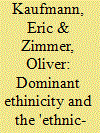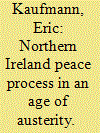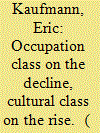| Srl | Item |
| 1 |
ID:
050923


|
|
|
|
|
| Publication |
Jan-Apr 2004.
|
|
|
|
|
|
|
|
|
|
|
|
|
|
|
|
| 2 |
ID:
084903


|
|
|
|
|
| Publication |
2008.
|
| Summary/Abstract |
This article argues that the world is in the midst of a long-term transition from dominant minority to dominant majority ethnicity. Whereas minority domination was common in premodern societies, modernity (with its accent on democracy and popular sovereignty) has engendered a shift to dominant majority ethnicity. The article begins with conceptual clarifications. The second section provides a broad overview of the general patterns of ethnic dominance that derive from the logic of modern nationalism and democratisation. The third section discusses remnants of dominant minorities in the modern era and suggests that their survival hinges on peculiar historical and social circumstances coupled with resistance to democratisation. The fourth section shifts the focus to dominant majorities in the modern era and their relationship to national identities. The article ends with a discussion of the fortunes of dominant ethnicity in the West.
|
|
|
|
|
|
|
|
|
|
|
|
|
|
|
|
| 3 |
ID:
135877


|
|
|
|
|
| Summary/Abstract |
It is often forgotten that, regardless of time or place, periods of high immigration are almost always periods of high anti-immigration sentiment. When ethnic change is rapid, driven by immigration or differences in ethnic natural increase, the ethnic majority often responds with a politics of immigration. This was true, for instance, in Britain in the 1960s, in the US during 1890–1925 and in interwar Scotland. I show that White British people in locales experiencing rapid ethnic change are more likely to call for lower immigration and to vote BNP. On the other hand, where there is already a high level of ethnic minorities, white opinion is less hostile to immigration: UKIP does poorly among whites in diverse areas. Habituation to change, typically within a decade, and assimilation—especially of Europeans—over a generation reduces hostility to immigration. If the rate of ethnic change slows, we should therefore expect a reduction in the salience of immigration. Ironically, because the children of European migrants are more readily accepted into the ethnic majority than is the case for non-Europeans, a shift from EU free movement to non-European skilled migrants, as is advocated by UKIP, could run counter to the wishes of its own supporters.
|
|
|
|
|
|
|
|
|
|
|
|
|
|
|
|
| 4 |
ID:
082678


|
|
|
| 5 |
ID:
112064


|
|
|
|
|
| Publication |
2012.
|
| Summary/Abstract |
The steady drip of dissident Republican attacks forms the backdrop to this special issue of Political Quarterly. Moreover, this comes at a time of economic austerity, when Northern Ireland faces unprecedented cuts to its public sector-dominated economy. The economic crisis in the South adds an additional layer of uncertainty to the picture. In the past, economic deprivation has been associated with conflict in Northern Ireland and elsewhere. Might the peace dividend and constitutional settlement which have underpinned the Northern Ireland 'miracle' since 1994 be under threat? Or is there now sufficient momentum in both of Northern Ireland's main ethnic communities that such an outcome can be safely averted? This paper summarises the thinking of our symposium and special issue on this topic, updating our picture of the Northern Ireland peace process.
|
|
|
|
|
|
|
|
|
|
|
|
|
|
|
|
| 6 |
ID:
156792


|
|
|
|
|
| Summary/Abstract |
In The New Politics of Class (NPC), Geoffrey Evans and James Tilley lay out a comprehensive new sociology and politics of class in Britain based on detailed empirical analysis of the foremost social surveys in the country. A strength of the book is that it provides a one-stop reference guide to social and political trends concerning class since surveys began in the 1960s. This is outlined in some fifty handy and well-crafted figures. For this reason alone, the book should be required reading for students of British politics.
|
|
|
|
|
|
|
|
|
|
|
|
|
|
|
|
| 7 |
ID:
084909


|
|
|
| 8 |
ID:
172402


|
|
|
|
|
| Summary/Abstract |
writing recently in this journal, Jon Bloomfield presents an interesting critique of the ‘Blue Labour’ school of thought on Britain’s centre‐left.1 His thesis is that while ‘the social alliances that sustained progressive politics for a century are disintegrating’, the emergence of the Blue Labour tendency is riddled with ‘fallacies and dangers’. He argues that against the backdrop of the post‐2008 financial crisis a ‘nationalist right’ has surged, redefining politics around issues of nation, culture and identity. Furthermore, ‘influential voices across the centre and left of politics’—including ourselves—‘have accepted much of this far‐right analysis and adopted its language and terminology’. In the aftermath of Brexit, these trends—Bloomfield argues—‘have crystallised in the UK around the label of ‘Blue Labour’.
|
|
|
|
|
|
|
|
|
|
|
|
|
|
|
|